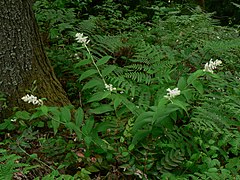Maianthemum racemosum
| Smilacena racemosa subsp. var. | False Solomon's seal, False spikenard, Solomon's zigzag | |||||||||||||||||||||||||||||||||||||||||||||||||||||||
|---|---|---|---|---|---|---|---|---|---|---|---|---|---|---|---|---|---|---|---|---|---|---|---|---|---|---|---|---|---|---|---|---|---|---|---|---|---|---|---|---|---|---|---|---|---|---|---|---|---|---|---|---|---|---|---|---|

|
|
| ||||||||||||||||||||||||||||||||||||||||||||||||||||||
| ||||||||||||||||||||||||||||||||||||||||||||||||||||||||
Maianthemum racemosum (Treacleberry, False Solomon's Seal, Solomon's plume[1][2] or False Spikenard; syn. Smilacina racemosa) is a species of flowering plant in the family Ruscaceae, native to North America.
It is a woodland herbaceous perennial plant growing to 50-90 cm tall, with alternate, oblong-lanceolate leaves 7-15 cm long and 3-6 cm broad. The flowers are produced on a 10-15 cm panicle, each flower with six white tepals 3-6 mm long blooming in late spring. The plants produce green fruits that are round and turn red in late summer.
It grows from cylindrical rhizomes about 0.3 m long.[2]
Maianthemum racemosum grows in bicoastal habitats in North America up to elevations of 7,000 feet. The most robust and profuse occurrences of this plant are typically found in partial shade and deep, moist, soft soils. In the western part of North America an example typical habitat would be in a shaded ravine or riparian corridor with common understory associates of Dryopteris arguta, Trillium ovatum and Adiantum jordanii.[3]
Cultivation
Propagation
Pests and diseases
Varieties
Gallery
References
- ↑ "Solomon's-plume (False Solomon's-seal)". Connecticut Botanical Society.
- ↑ 2.0 2.1 "Maianthemum racemosum". Flora of North America.
- ↑ C. Michael Hogan. 2008. Coastal Woodfern (Dryopteris arguta}, GlobalTwitcher, ed. N. Stromberg
External links
- w:Maianthemum racemosum. Some of the material on this page may be from Wikipedia, under the Creative Commons license.
- Maianthemum racemosum QR Code (Size 50, 100, 200, 500)


